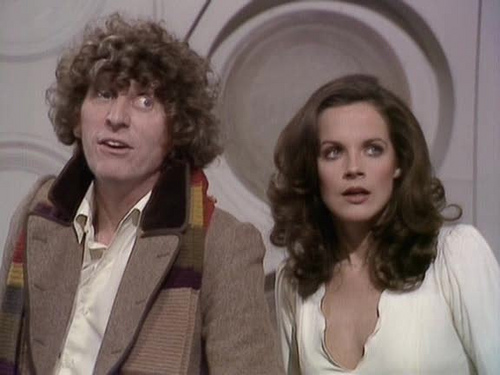The Middleman: Americas Dr. Who?

I must admit I miss the Middleman and after reading an article that posted at Tor.com really made me think about what I loved so much about the series. Check out article article that posted on www.tor.com .
Full article is below.
Everyone adores Doctor Who, even here in the colonies. We love its optimism, its adventurous spirit, the weird technology and the aliens that are often more human than the humans. We love the unabashedly positive hero and his succession of spunky companions. But we overlooked what could have been our own Who, a show that gave these same concepts a decidedly American spin: The Middleman.
The show ran for twelve episodes on the ABC Family Network back in 2008. The nameless Middleman is a straight-laced hero with a 1950s moral outlook (I mean that in a good way) who recruits Wendy Watson as his new assistant and Middleman-in-training. She’s an ultra-modern, post-ironic Bohemian artist whose crucial trait is that she never panics. As the Middleman says in the first episode:
“You know how in comic books there’s all kinds of mad scientists and aliens and androids and monsters and all of them want to either destroy or take over the world? Well, it really does work like that.”
So how is this like Doctor Who?
1.) Optimism. The show flirted with darkness, but the spirit was always upbeat. The world might mock the Middleman’s milk-drinking wholesomeness (His curses run to expressions like, “Guns of Navarone!”) but he’s unashamed of it. Like the Doctor, he’s a self-motivated compassionate do-gooder, always willing to help those in need. And like the Doctor, very little throws him off-stride.
2.) Advanced technology that really makes no sense. The Doctor has the TARDIS (Time And Relative Dimensions In Space), while the Middleman has the strange, disco-ball contraption known as the HEYDAR. (High Energy Yield DAta Resource). In both series, this technology is never adequately explained, and never functions in a consistent manner; its purpose is to speed through narrative spots that would otherwise bog down the show. And in both shows, the creators made sure the devices themselves are quirky and entertaining (the TARDIS is stuck in the shape of a British police call box, the HEYDAR’s mouthpiece robot Ida has the persona and appearance of a cranky librarian).
3.) A companion who functions as the audience surrogate. This figure shows up in a lot of great SF: s/he’s the normal person drawn into extraordinary events, and his/her reactions guide the audience. The Doctor has had a series of such companions, while the Middleman, alas, only had time for one. To me, Wendy’s relationship with the Middleman most resembles the Doctor’s relationship with his fellow Time Lord-in-training Romana: she challenges, teases and occasionally spars with our hero, but under it all she unabashedly admires him.
4.) Limitless possibility for adventures through time and space. Both shows are unbound by the constraints of a realistic universe. The Doctor can literally go anywhere and any time, regularly encountering aliens and advanced (or primitive) human societies. The Middleman encountered numerous aliens, and in one episode a parallel dimension; there’s no reason to think that, had it lasted, its scale would not have expanded to the entire universe.
5.) A hero who’s the latest in a long line of identically named heroes. The Doctor is on his eleventh incarnation; we meet the 1960s Middleman in one episode, and Wendy is explicitly being trained to become the next one. This sense of continuity and history gives weight to the shows’ central mythologies.
And finally:
6.) It’s a show that the whole family can enjoy, and I mean that in the best possible, literal way.
I love The Middleman,and I’m truly sorry it didn’t catch on. Would it have matched Dr. Who’s forty-years-and-counting run? Probably not. But it could have countered the omnipresent dystopia and nihilism in science fiction television, and provided American kids with the kind of hero that could help them combat nightmares (as the Doctor does for my son). And the loss, my friends, is all ours.
Alex Bledsoe, author of the Eddie LaCrosse novels (The Sword-Edged Blonde, Burn Me Deadly, and the forthcoming Dark Jenny), the novels of the Memphis vampires (Blood Groove and The Girls with Games of Blood) and the first Tufa novel, the forthcoming The Hum and the Shiver.





S. George Lee
April 30, 2011 at 6:35 pm
I only recently discovered “The Middleman” and have to say, it rocketed to a high slot on my list of favorite shows. Great comparison to Doctor Who (my all-time favorite). i’m gutted that this show never got the shot it deserved- it really is glorious. When I see “Eureka” and “Warehouse 13” doing so well- and they are fun- I feel the injustice that MM- a far superior show- doesn’t enjoy the same success.
I can only hope for a similar afterlife that Farscape has- an ongoing comic that has captured the spirit of the show, and maybe webisodes that would actually materialize.
Nancy Sargent
May 1, 2011 at 5:03 pm
I was reading your article “The Middleman: America’s Dr. Who” and I agree about loving the series! Who are the dumbies that are giving t.v. ratings now days? I love shows like this! I eagerly awaited every week for this to come on, and then all of a sudden ‘poof!’ it was gone. I kept looking for it to come back on, but now I finally read that it was offed because some ‘PBS worshippers’ are controlling the t.v. shows of America! I also have watched the “Charmed” series inside and out, and I loved the t.v. series of “Honey I Shrunk the Kids”. Right now my favorite show is “Raising Hope”, and I ‘hope’ it stays on the air for a very long time!!! I think Matt Keeslar and Natalie Morales were great together in The Middleman and I’d like to see them acting together again on something.
Sincerely,
Nancy Sargent